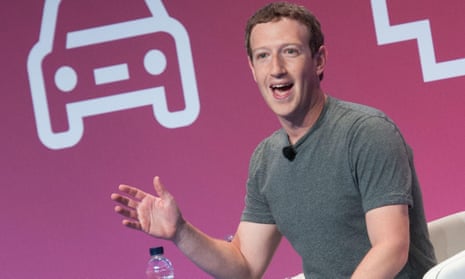I f there were a Nobel prize for hypocrisy, then its first recipient ought to be Mark Zuckerberg, the Facebook boss. On 23 August, all his 1.7 billion users were greeted by this message: “Celebrating 25 years of connecting people. The web opened up to the world 25 years ago today! We thank Sir Tim Berners-Lee and other internet pioneers for making the world more open and connected.”
Aw, isn’t that nice? From one “pioneer” to another. What a pity, then, that it is a combination of bullshit and hypocrisy. In relation to the former, the guy who invented the web, Tim Berners-Lee, is as mystified by this “anniversary” as everyone else. “Who on earth made up 23 August?” he asked on Twitter. Good question. In fact, as the Guardian pointed out: “If Facebook had asked Berners-Lee, he’d probably have told them what he’s been telling people for years: the web’s 25th birthday already happened, two years ago.”
“In 1989, I delivered a proposal to Cern for the system that went on to become the worldwide web,” he wrote in 2014. It was that year, not this one, that he said we should celebrate as the web’s 25th birthday.
It’s not the inaccuracy that grates, however, but the hypocrisy. Zuckerberg thanks Berners-Lee for “making the world more open and connected”. So do I. What Zuck conveniently omits to mention, though, is that he is embarked upon a commercial project whose sole aim is to make the world more “connected” but less open. Facebook is what we used to call a “walled garden” and now call a silo: a controlled space in which people are allowed to do things that will amuse them while enabling Facebook to monetise their data trails. One network to rule them all. If you wanted a vision of the opposite of the open web, then Facebook is it.
The thing that makes the web distinctive is also what made the internet special, namely that it was designed as an open platform. It was designed to facilitate “permissionless innovation”. If you had a good idea that could be realised using data packets, and possessed the programming skills to write the necessary software, then the internet – and the web – would do it for you, no questions asked. And you didn’t need much in the way of financial resources – or to ask anyone for permission – in order to realise your dream.
An open platform is one on which anyone can build whatever they like. It’s what enabled a young Harvard sophomore, name of Zuckerberg, to take an idea lifted from two nice-but-dim oarsmen, translate it into computer code and launch it on an unsuspecting world. And in the process create an empire of 1.7 billion subjects with apparently limitless revenues. That’s what permissionless innovation is like.
The open web enabled Zuckerberg to do this. But – guess what? – the Facebook founder has no intention of allowing anyone to build anything on his platform that does not have his express approval. Having profited mightily from the openness of the web, in other words, he has kicked away the ladder that elevated him to his current eminence. And the whole thrust of his company’s strategy is to persuade billions of future users that Facebook is the only bit of the internet they really need.
Ironically, Zuckerberg’s cynical tribute to Tim Berners-Lee came a day after Nick Denton published his obituary of Gawker, the pioneering and raucous news website that he created 13 years ago. Gawker was bankrupted – and ultimately shuttered – by a privacy action that had been funded by Peter Thiel, a billionaire Silicon Valley eccentric (and Trump supporter) who had been infuriated by a Gawker article that called for Thiel to be recognised as the world’s most successful gay venture capitalist.
As that uber-blogger Dave Winer observed: “Gawker is gone because Peter Thiel financed its murder-by-lawyer. It’s legal to do this in the US, but until now as far as I know, no one has crossed this line. Now that the line has been crossed, it’s fair to assume it will become standard practice for billionaires like Thiel to finance lawsuits until the publication loses and has to sell itself to pay the judgment.”
I wasn’t ever a great admirer of Gawker, but Dave Winer is right: Thiel’s strategy demonstrates how tech money not only talks, but can now also suppress freedom of expression, even in the land of the first amendment. Interestingly, Thiel is also a member of Facebook’s board of directors. So will Zuckerberg’s commitment to an “open and connected world” extend to firing him? You only have to ask the question to know the answer. Hypocrisy rules OK.

